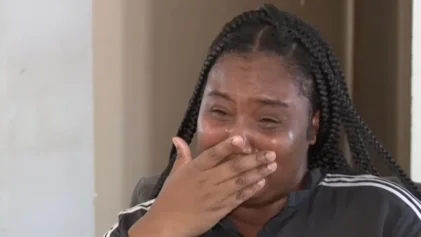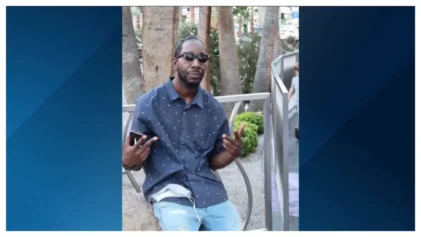A Rhode Island teenager has been awarded a $25,000 scholarship for her proposal about how to spend $1 million to help the nation’s smallest state’s Black and brown communities close the racial wealth, employment and education gaps.
Mariam Kaba, 16, is the daughter of West African immigrants and the first-ever winner of the Transform Rhode Island Scholarship for $25,000 and a seat at the table as the Papitto Opportunity Connection invests a million dollars to make her ideas to improve Black and brown communities in the state a reality.
The scholarship is funded by the Papitto Opportunity Connection Foundation which, “seeks to help Rhode Island high school students of color to get past the financial obstacles to higher education, affordable housing and access to healthcare services while also empowering them to create change in their communities.”
The Papitto Opportunity Connection is a nonprofit working with Rhode Island’s minority communities focused on education, job skills training and entrepreneurship.
Kaba is a high school sophomore in Woonsocket, Rhode Island, a city of about 43,000 people located 15 miles north of Providence, Rhode Island. Woonsocket mirrors the state’s population demographics with a Black population around 8% and more than 80% white.
Kaba says as a young activist focusing on communities of color, she noticed early on the disparities that exist between Rhode Island’s Black and white communities.
“I do a lot of community work in Woonsocket, Rhode Island and do a lot of activism work so I get to see firsthand what we lack and what we need in the community so thought maybe I can put my ideas onto a presentation,” Kaba said of the racial disparity.
Rhode Island’s poverty rate for its Black residents is 22 percent, double the poverty rate of its white residents according to a recent 24/7 Wall St. report. The report also says the unemployment rate for the Ocean State’s Black residents is 9.7 percent, compared with 4.7 percent for white residents.
Kaba says she experienced the disparity in resources firsthand when she attended a predominantly white high school in Cumberland, Rhode Island, where the median household income exceeds $96,000 according to census data.
“Cumberland is predominantly a white city, and their city is so clean and furnished, their education is like a hundred steps ahead of us, so me coming back here is like, Woonsocket is a low-income city, we’re a predominantly minorities, look at our education, look at what we’re learning, we’re so behind,” Kaba said.
When Kaba learned of the Papitto Opportunity Connection Scholarship, which asked high school students to pitch what they could do with a million dollars to help improve the lives of the Rhode Island’s communities of color, she hopped on the opportunity. Kaba beat out nearly a hundred other students with her essay explaining how her plan could close the racial disparity gap.
“They always say, the cream rises to the top, my goodness she did all the way, everyone looked at her proposal in our review said, ‘wow’,” said Barbara Papitto, Founder of the Papitto Opportunity Connection Foundation.
Kaba explains her essay outlined “bi-monthly job fairs and job aid and job creation, helping people with their interviews, getting them clothes and getting them prepared and all the things they need in terms of financial help.” She went on to share the second part of her essay which focused on youth.
“The second part is the ‘prepare for the future curriculum’, which is basically mandates personal financial literacy class for all schools, having a job exploration elective where kids have firsthand experience in jobs, they find interesting and connect them with mentors” Kaba said.
The final portion of Kaba’s essay emphasized investment into the community. “Restoring the village, and the village is our community so bi-monthly cleanups, having recreational events, investing into small businesses and parks and just refurnishing the city,” she said of her plan that helped her beat out 96 other high schoolers vying for the million-dollar investment to help Rhode Island’s Black and brown communities.
“As I read her proposal, it was so thoughtful, and so well presented, and so many ideas that are critical to pulling together what we’re doing,” said Barbara Papitto.
“This scholarship will change lives, both for the students who receive a financial award from Transform Rhode Island Scholarship, and for their communities,” said John A. Tarantino, POC Managing Trustee. “The level of thought and creativity displayed by all of these students is truly remarkable, and we hope both the scholarships and our commitment to their ideas are empowering for young people of color who are often not heard.”
Kaba is just one example of many young people of color in Rhode Island taking control of their own communities and futures says Rhode Island’s Black Lives Matter, Executive Director, Harrison Tuttle.
“What we see in Rhode Island is we see a huge wave of young people rising up in different ways they feel comfortable in and making a difference in the community,” said Tuttle.
Tuttle leads the state’s Black Lives Matter chapter, which formed shortly after the murder of George Floyd and the national racial reckoning on race relations. He says Rhode Island’s state leaders have not done enough to address disparities adversely impacting its communities of color where 8.5 percent are Black, 16.3 percent are Hispanic, 3.7 percent are Asian.
“Our government has not worked for people color and working-class people in general and because of that you see disparities in income level and the basic needs people want,” Tuttle said.
In addition to the million dollars going to her plan to improve the state’s Black and brown communities, Kaba also received a $25,000 scholarship from POC. The million dollar investment will be implemented over the next year.
The sophomore and community activist is also the vice president of Silence is Violence 401, a youth-led advocacy organization focused on communities of color. With a couple years before her high school graduation, Kaba is still figuring out her career plans, which could include a business owner, working in law or as a dentist.


